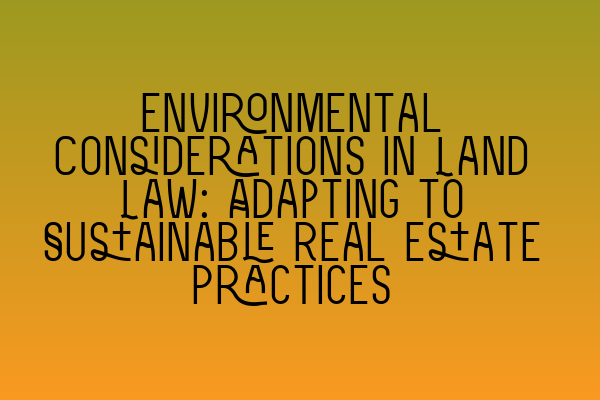Environmental Considerations in Land Law: Adapting to Sustainable Real Estate Practices
As the world becomes more aware of the importance of sustainable practices, the field of property law has had to adapt to meet the changing environmental landscape. Environmental considerations in land law have become increasingly important, not only for the protection of the planet but also for the long-term viability of real estate investments. In this blog post, we will explore the key environmental considerations in land law and how they impact sustainable real estate practices.
1. Understanding Environmental Law
Environmental law is a complex and ever-evolving field that encompasses a wide range of regulations and statutes aimed at protecting the environment. In the context of land law, environmental regulations often focus on issues such as pollution, waste management, and conservation. It is essential for property lawyers to have a thorough understanding of these laws to ensure compliance and to advise clients accordingly.
2. Environmental Due Diligence
Before purchasing or developing a piece of land, it is crucial to conduct thorough environmental due diligence. This process involves investigating the environmental history of the property, including any past contamination or potential risks. Engaging in comprehensive due diligence can help identify potential environmental liabilities and ensure that appropriate measures are put in place to mitigate any risks. This not only protects the environment but also protects the interests of the property owner or developer.
3. Sustainable Development
Sustainable development has become a buzzword in the real estate industry, and for a good reason. Sustainable development practices aim to meet the needs of the present generation without compromising the ability of future generations to meet their own needs. This involves considering the environmental, social, and economic impacts of development projects.
Several sustainable development practices can be integrated into real estate projects, such as:
– Incorporating energy-efficient design and technologies to reduce energy consumption and carbon emissions.
– Implementing waste management strategies to minimize waste generation and promote recycling and reuse.
– Preserving green spaces and natural habitats to promote biodiversity.
– Using sustainable building materials and construction methods to reduce the environmental footprint of the project.
By incorporating these sustainable practices into real estate development projects, property owners can not only reduce their impact on the environment but also create properties that are more attractive to environmentally conscious tenants and investors.
4. Climate Change Adaptation
With the growing threat of climate change, property lawyers must consider climate change adaptation strategies in land law. This includes assessing the risks associated with climate change, such as rising sea levels, extreme weather events, and changing rainfall patterns. Property owners must take steps to protect their assets from these risks and ensure the long-term viability of their investments.
Some climate change adaptation strategies that can be implemented include:
– Conducting flood risk assessments and implementing flood protection measures.
– Incorporating green infrastructure, such as rain gardens and permeable surfaces, to manage stormwater runoff.
– Assessing the vulnerability of buildings to extreme weather events and implementing resilient design features.
– Considering the long-term impacts of climate change when making land use planning decisions.
By incorporating climate change adaptation strategies into land law, property owners can better protect their assets, enhance the resilience of their properties, and contribute to overall environmental sustainability.
In conclusion, environmental considerations in land law are becoming increasingly important in the face of growing environmental challenges and the demand for sustainable real estate practices. Property lawyers and developers must be well-versed in environmental law, conduct thorough environmental due diligence, implement sustainable development practices, and consider climate change adaptation strategies. By doing so, they can not only protect the environment but also ensure the long-term viability and success of real estate investments.
Related Articles:
SQE 1 Practice Exam Questions
SQE 1 Practice Mocks FLK1 FLK2
SQE 2 Preparation Courses
SQE 1 Preparation Courses
SRA SQE Exam Dates
